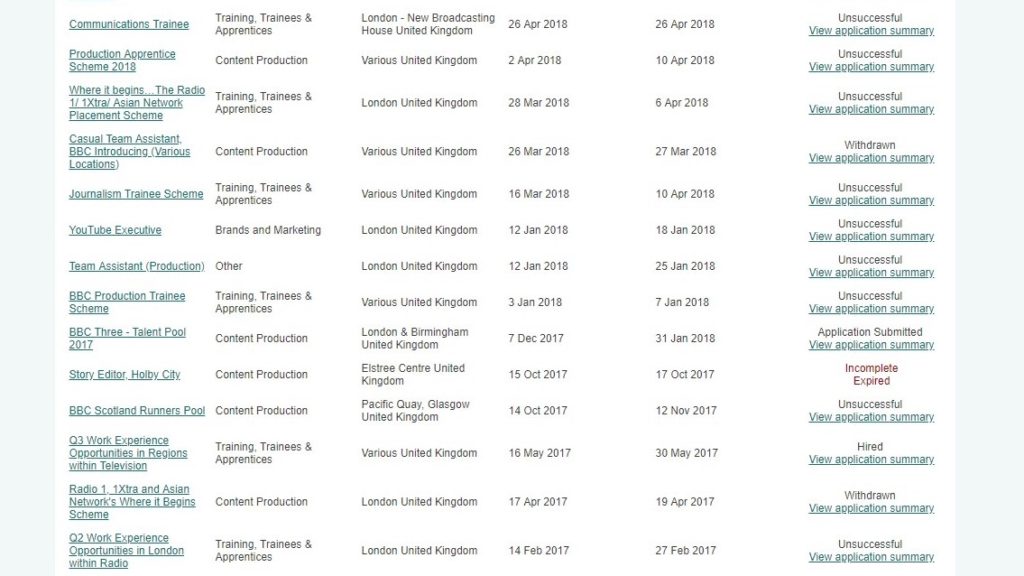“People can tell you no, but it’s up to you whether you listen to them.”
One subject few people talk about is the immediate situation after leaving university, especially for those who want to work in media. Yes, it is excellent if you get a place on a Graduate Scheme straight away in a large London based company, but this option is not for everyone (believe me, I’ve tried). You can’t force yourself into a job you don’t want to do. But what if you don’t know what you want to do? I took inspiration from Radio 1 DJ Annie Mac, who I saw speaking at Teignmouth Pavilions in May 2016 as part of BBC Radio 1’s Academy. She decided to list the three most important things to her to help her decide future job prospects. For her it was: Music, Friends and Creativity. (Hence her successful radio career and additional music projects). Mine are:
- Languages
- Travel
- Media
They can be vague; they can be specific, as long as it gets you thinking!
One of my New Year’s Resolutions was to only apply for jobs I want not to waste my time. But which advice should you follow? You don’t want to seem too desperate. Do more applications to the same company equate to more chance of being noticed? Below I have screenshotted all of my unsuccessful BBC applications (not sure I should be highlighting this!), but it shows my dedication and persistence. Maybe it’s not meant to be. Maybe I haven’t figured out the system yet. Maybe I should start looking elsewhere. It is essential to learn from each rejection. Every problem/rejection/failure is an opportunity. I have some friends who keep a “rejection” folder on their desktop. I don’t (it would take up too much space/memory lol). I choose to move on, forget about it and find an alternative opportunity or make a note to apply again in the future, or apply to a different department or location.
There is conflicting advice about application forms. Some say quantity over quality, apply for as much as possible. Others will suggest spending time on making one perfect application. There are pros and cons to both. Find out which method you prefer. I always look for short application forms, a quick CV upload or a click on LinkedIn. It can get tiring when you hear nothing back for months. But something will stick. I was given this advice from a career mentor at the University of Exeter who had previous work experience at the BBC and YouTube.
I also somewhat believe that everything happens for a reason in some cases. One opportunity can lead to another. For example, during a week of CBBC TV Drama work experience, I was advised to join the Facebook page: ‘People looking for work in TV: Runners’. I applied for many opportunities on this page, one of which is a European placement in a creative industry. It was a job that would involve languages, travel, and media. Was it luck that I found it? Would I have found it anyway? I’ll never know.
Another important aspect of finding the perfect media job is networking. Whether that be via email and LinkedIn or in real life. I keep a handwritten book of contact details of people who have interviewed me, employers I’ve met at events, graduates I’ve spoken to at Careers Fairs and professionals I’ve been in touch with through mentoring programmes.
One piece of advice I have kept with me is: “BE GOOD AT EMAILS.” I was told this by Tim Johns (BBC Radio 2 Producer) at the Student Radio Association Conference (SRACon) in April 2015. At first, I didn’t understand how you could be bad at emails, but this simple but practical and essential advice has led to opportunities such as interviewing artists and authors and working live music events.
Potential tips for good emails
- Add hyperlinks to your LinkedIn, Mixcloud, blog, etc. at the end of an email
- Keep it simple: who are you and what are you enquiring about
- Make sure you get the correct spelling of names, companies, and places
- Look up the recipient on LinkedIn, just in case you have something in common (University city, home town, etc.) and mention it if appropriate
I follow inspirational CEOs in various creative industries, from Steven Bartlett (Social Chain) to Zoe Sugg (Zoella). Whoever inspires you, it could be in an unrelated industry; it could be a cheesy Instagram account, it could be a friend – whoever it is, continue to be inspired by their online work.
It seems that millennials are reclaiming the word “hustle.” It’s not a word I had used before but have found myself saying it more recently when explaining stories of job applications. Especially in media and freelance work, the word “hustle” is great to explain the process of finding a job.
I also think it is important to realise that some (not so great) short-term jobs do provide key skills that could be needed in the future. It’s hard to imagine, but many successful people look back at catering jobs, bar work and retail positions as the most important work they did in terms of learning, social skills, time management, and HARD WORK.
WHERE ELSE TO FIND ME:



